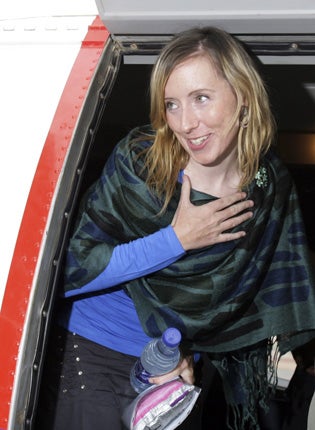Kidnapped aid worker flies home after trauma of mock executions

Irish aid worker Sharon Commins arrived back in Dublin last night, free at last after three and a half months as a hostage of bandits in the mountains of Darfur, in western Sudan.
Ms Commins, 32, and her Ugandan colleague Hilda Kawuki, 42, were seized from the Darfur compound of Goal, an Irish aid agency, in July, when three gunmen burst in and held guns to their heads. They were guarded by up to 18 men who repeatedly went through the motions of executing them.
"There were mock assassinations on a few occasions, so it was extremely scary," Ms Commins told RTE, the Irish state broadcaster. "We'd be told to kneel on our knees and they would shoot around us. Obviously the first time that happened, we thought we were actually going to be shot. And each time we think: okay, I hope it's a mock. But you never know. None of these guys wear glasses so you are not even sure how accurate their sight is, so it was just an extremely dangerous situation to be in."
Ms Commins said that it was the moral support she and her co-captive had given to each other that enabled them to survive the ordeal. "You could die in there of sadness," she said. "You could just die if you didn't lift your spirits. It was incredibly sad every morning. Such a heavy burden to continue. We definitely needed each other. We prayed together and tried to keep each other strong."
They were moved between four different mountain camps, exposed to the sun by day and the cold by night, with only two blankets for shelter. They were fed twice a day but given very little water, and were only allowed to wash once a fortnight.
Ms Commins said they owed their lives to their captors' continued hopes of obtaining a ransom – but as the weeks passed without payment, their situation became more precarious. "They were getting increasingly frustrated that they were paying money to feed us," she said. "We were still happy to be alive, but extremely fearful. We were never confident that we would be kept alive."
Join our commenting forum
Join thought-provoking conversations, follow other Independent readers and see their replies
Comments
Bookmark popover
Removed from bookmarks